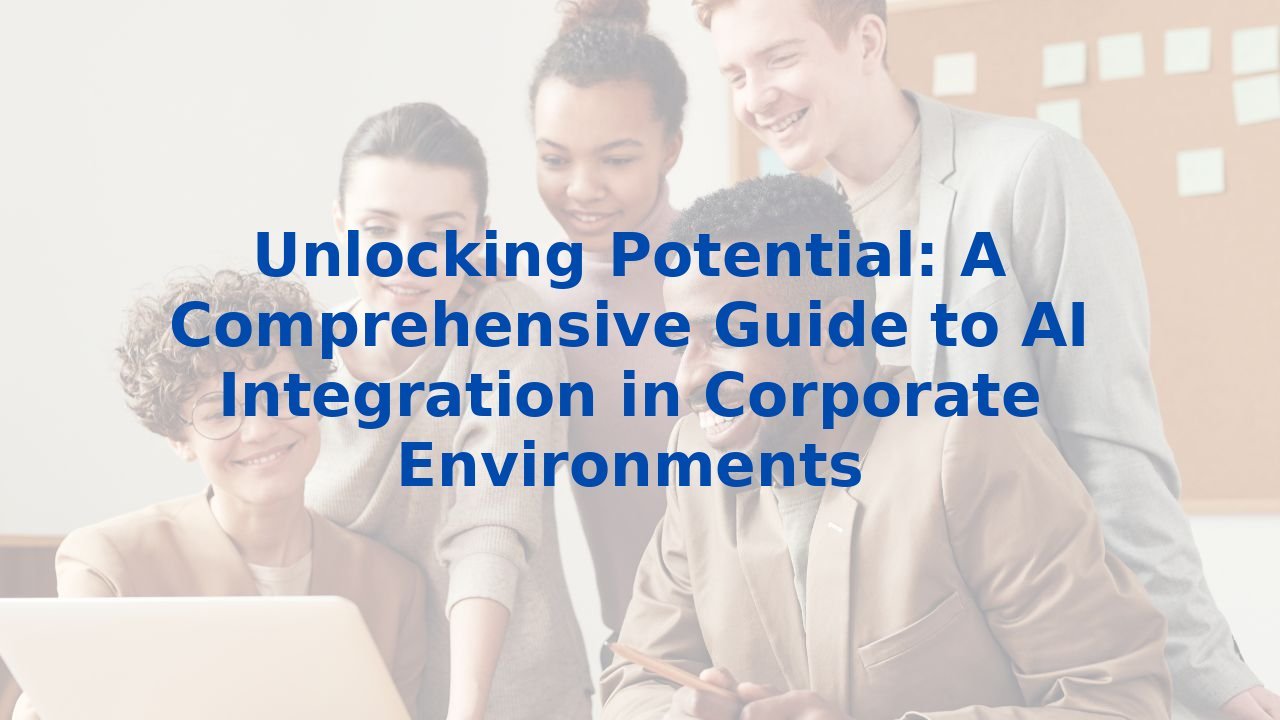Unlocking Potential: A Comprehensive Guide to AI Integration in Corporate Environments
Unlocking Potential: The Role of AI in Corporate Integration
In today's fast-paced, data-driven landscape, the integration of artificial intelligence (AI) into corporate environments is not just a trend; it’s an imperative. The benefits of AI transcend mere automation, redefining how organizations operate and thrive. This guide explores how AI enhances critical business processes, amplifying efficiency and sparking innovation.
Operational Efficiency
Imagine a workplace where repetitive tasks like data entry and reporting are seamlessly automated. This is the reality AI promises. By offloading these mundane duties to AI systems, teams can redirect their focus toward strategic initiatives that foster growth. Take, for instance, the application of AI in customer service. Chatbots can handle routine inquiries 24/7, allowing human agents to devote their time to more complex customer challenges that require empathy and nuanced understanding.
Data-Driven Decision Making
AI is a powerhouse when it comes to data analytics. By processing vast datasets at lightning speed, it uncovers insights that lay hidden to the human eye. Executives armed with AI-generated analytics can make informed decisions that are timely, accurate, and based on real-time data. The ability to anticipate future trends and adjust strategies accordingly can differentiate successful organizations from those that lag behind. Imagine having the foresight to adapt your marketing strategies before trends peak—thanks to AI, this is now possible.
Talent Acquisition and Management
Recruitment often feels like a race against time, and AI is changing the game. By automating the initial screening of resumes and matching candidates to roles, AI enhances both the efficiency and fairness of the hiring process. HR professionals can shift their focus from sifting through applications to engaging with candidates and refining talent acquisition strategies. This streamlined approach not only reduces time-to-hire but also ensures that the most qualified candidates are identified sooner. Investing in systems that support AI in recruitment can yield profound impacts on overall workforce quality.
Enhanced Customer Insights
Understanding your customers has never been more vital, and AI provides the tools to deliver personalized experiences that boost satisfaction and loyalty. By analyzing customer interactions and preferences, AI helps businesses craft tailored marketing campaigns, make intelligent product recommendations, and offer exceptional customer service. The result? Increased revenue and customer engagement. Companies like Amazon have harnessed this concept to great effect, using AI to drive significant cross-selling and upselling opportunities.
Risk Management
As businesses navigate complex landscapes, the importance of effective risk management becomes apparent. AI excels at detecting unusual patterns that may indicate fraud or compliance issues. By employing sophisticated algorithms, companies can monitor data in real-time, ensuring that potential threats are identified and addressed swiftly. This proactive approach not only protects assets but also cultivates trust with stakeholders and customers alike.
Supply Chain Optimization
Logistics can make or break a company’s efficiency, and AI is set to revolutionize this domain as well. From predictive maintenance to inventory management, AI optimizes supply chain operations by reducing costs and improving service levels. By calculating ideal inventory levels and predicting maintenance needs, organizations can ensure optimal efficiency and responsiveness, all while minimizing waste. A well-oiled supply chain is no longer a dream; it's within reach.
Fostering Innovation
At its core, AI is a catalyst for innovation. It accelerates product development cycles and reveals new market opportunities. Thanks to technologies such as machine learning and natural language processing, businesses have the tools to create innovative products and services that meet evolving consumer demands. Organizations that harness AI effectively will not just keep pace with industry changes; they’ll lead the charge, setting benchmarks for others to follow.
The Importance of Employee Training
To fully realize the potential of AI integration, organizations must invest in their most valuable asset: their people. Embracing this transformation necessitates a cultural shift towards continuous learning and innovation. Employees must be equipped with the skills to understand AI insights and leverage them for maximum impact. Effective training empowers teams, ensuring that they work seamlessly alongside AI applications. Businesses that prioritize staff development on AI will secure a competitive edge in an increasingly digital world.
Conclusion
In wrapping up, it’s clear that AI is not just a tool to enhance efficiency; it’s a transformative force that can redefine entire industries. As companies integrate AI into various business functions—from automating tasks to powering data-driven strategies—they unlock unparalleled potential. By cultivating a workforce adept in AI skills, organizations not only bolster operational efficiency but also position themselves as leaders ready to navigate the future. Ready to take the leap? Investing in training and development tailored to your team can illuminate the path forward.



